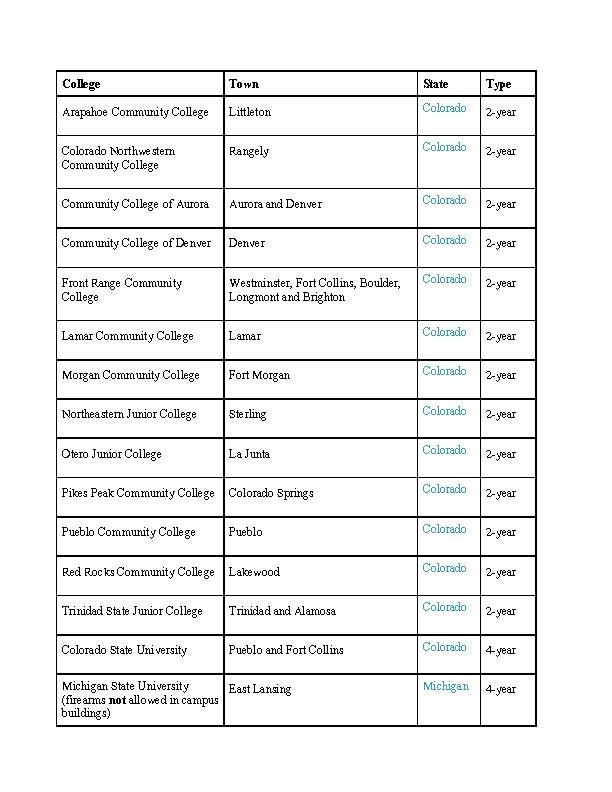Arizona lawmakers are not the only ones considering allowing guns on college campuses. Over the past year, lawmakers in other states have debated, and passed, similar legislation.
In 2011, 23 states proposed bills that resemble Arizona’s Senate Bill 1474, which would allow students, faculty members and visitors with gun permits to have a concealed firearm on school property. Out of the 23 states, Mississippi and Wisconsin were the first to approve and enact the legislation. On March 5, the Colorado Supreme Court ruled that University of Colorado’s gun ban was in violation of a state statute.
“We have laws that allow people to have concealed weapons virtually everywhere in our states and it hasn’t been a problem,” said Adrienne O’Reilly, southwest regional director for Students for Concealed Carry. “So why would it change if we cross this invisible boundary that separates off campus from on campus?”
This is not the first time Arizona lawmakers have proposed legislation that would allow guns on college campuses. Last year, five similar bills were proposed and dismissed. Andy Pelosi, president of Gun Free Kids, an organization that provides information on gun violence prevention, said he traveled from his home in New York to Arizona last year to help lobby against these proposed bills.
“My experience with Arizona is that over the last few years college presidents have been vocal about not wanting guns,” Pelosi said. “Law enforcement doesn’t support this, schools don’t want it, so my question is why are the legislators trying to pass this?”
Legislators from other states have also debated allowing guns on campus for many years. In 2004, lawmakers in Utah passed a bill that restricts its state institutions to develop a policy prohibiting a gun owner’s right to carry a concealed firearm. And in 2007, shortly after the Virginia Tech shooting that resulted in the deaths of 32 students and faculty members, the University of Utah’s ban that prohibited guns on campus was lifted by the Utah Supreme Court ruling it was unconstitutional.
The college then created a new policy that allowed any person with a valid gun permit to carry a weapon onto campus. University of Utah’s Chief of Police Scott Folsom said since instating the policy five years ago, the college has seen neither a decrease nor an increase in crime on campus or gun-related activity.
“The Legislature in Utah has determined that people who are properly permitted are allowed to carry a weapon,” Folsom said. “If people are uncomfortable around that or unsure whether someone is unlawfully carrying, they can always call their local law enforcement.”
All gun owners in Utah must be at least 21 years old to obtain a gun permit. Permit holders in Utah had to take a gun safety course, pass a background check and pay a $51 fee. Because gun owners do not have to apply for a special permit to carry a gun on campus, Folsom said it is hard to determine how many students or faculty members typically bring a firearm to school.
“People are sometimes frightened of the weapon and forget that the person carrying it is most likely a law abiding person who has gone out of their way to comply to the law and get a permit,” Folsom said.
The University of Utah has also installed gun lockers at its police station for students to stow their firearms if they live on campus. If SB 1474 passed in Arizona, the Arizona Board to Regents said it anticipates installing similar lockers around buildings and classrooms on college campuses. The lockers, bays and signage would cost $13.3 million among the three public universities and an annual fee of $3.1 million to maintain.
“If the school chooses to install a gun locker, that is entirely the school’s responsibility and decision,” O’Reilly said. “Legislation in no way forces or recommends that campuses install gun lockers.”
Pelosi said he thinks people should be concerned about the cost projected by the regents to install the lockers, as he anticipates the funding will come out of students’ pockets.
“I think that given the current economic climate it’s ridiculous because the schools are going to pass this onto students and parents to pay the bill,” Pelosi said. “There is no reason to have these guns on campus or have students pay the added expense.”
Since Pelosi started the Campaign to Keep Guns Off Campus in 2008, 312 colleges and universities, including the UA, have signed resolutions provided by the organization against guns on campus and sent them to lawmakers.
While Pelosi and O’Reilly differ on the issue of allowing guns on campus, both agreed that lawmakers and citizens need to be educated on the topic.
“If every legislature and every constitution is educated on this idea of campus carry, then I’ll be absolutely fine if they vote no on it,” O’Reilly said. “But what we see is a lot of miseducated constituents and misinformed representatives and senators voting on this issue.”
Where is SB 1474 now?
The Arizona House of Representatives voted to approve the proposed legislation on March 7, but the measure has not cleared the Senate. It is also unclear if Gov. Jan Brewer, who was endorsed by the National Rifle Association, will sign the bill or not.








